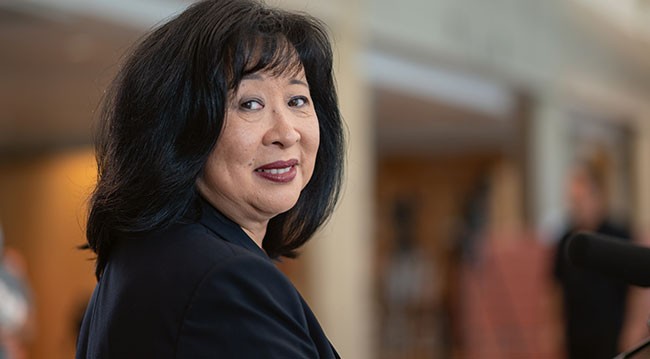This year's virtual Essential Director Update saw addresses from Lisa Chung AM and Graham Bradley AM, as well as a discussion on topical director concerns. Here's what you may have missed.
The AICD hosted the 14th annual Essential Director Update (EDU) on 7 October. Consistently rated as one of the top benefits of membership, the EDU is a one-stop shop for the latest developments in governance, regulation and directorship. The complimentary EDU is fundamental to building the capability of AICD members. This was the first time it was exclusively online, delivered as a series of webinars ending in live panel sessions.
Lisa Chung AM FAICD, a director of Australian Unity Limited, The Front Project and Artspace, said key issues for directors were workplace health and safety challenges that have arisen under COVID-19, along with increasing complexities when it comes to the board’s oversight of culture.
Leading into 2021, she said, directors should consider how they can “activate our ingenuity to come out better on the other side”, as well as how the workplace is evolving as a result of changed work practices and what that means for future workforce planning. She nominated two challenges for directors in 2021: the reset and the need for “legacy thinking”.
“It’s been a momentous year by any measure and the events we have witnessed are triggering the biggest reset opportunity in a generation,” she said. “How ready is your board for what’s next? Do you have the right skills on your board and executive to take advantage of the changed world? Are you a maker or a taker?”
When it comes to legacy thinking, she said directors should think carefully about how they conduct themselves as leaders, especially in times of crisis. “Our responses to these times of crisis will be remembered by our staff, customers and other stakeholders and will shape behaviours and culture in many ways into the future. What do we want our legacy to be?”

Chung outlined issues for directors:
- Workplace health and safety
- Board oversight of culture
- Reputation and stakeholder engagement
- Innovation and creativity
- Post-pandemic workplace
- Financial challenges for NFPs
In response to recommendations of the Safe Work Australia Boland Review, the offence of industrial manslaughter now exists, or is proposed, in legislation in all states and territories except South Australia and Tasmania. “The manslaughter legislation differs in important ways between states and territories, including different definitions of key concepts and different standards of proof for the manslaughter offence, such as requiring gross negligence or just negligence,” said Chung. “Directors potentially face prison terms under the laws and, under some state and territory legislation, including NSW, directors and companies are prohibited from entering into insurance arrangements that purport to cover monetary WHS penalties and legal costs.”
Chung said boards should undertake a review of D&O insurance terms to ensure they do not breach the new restrictions on WHS penalty indemnities and directors should be aware of potential personal exposure.
Chung said there was little doubt COVID-19 has been the ultimate stress test of organisational cultures, with issues ranging from redundancies, lay-offs, job and financial insecurity, juggling work and personal responsibilities, health concerns and uncertainty as to the future.
She pointed to Deloitte’s 2020 Global Human Capital Trends report, which named wellbeing and belonging as the top global trends for the year. She urged directors to discuss how to factor these into their boards’ consideration of culture.
Chung said many things can impact reputation, noting recent controversies at AMP and Rio Tinto. “What these two case studies highlight, is that issues we might once have categorised under corporate social responsibility and ESG, have become concerns which strike firmly at the very heart of a company’s reputation and, arguably, highlight cultural weaknesses,” said Chung.
“They follow the same path as the approach to climate change, which has transitioned from being regarded as an ESG issue to becoming one that many, if not most companies, now treat as a significant financial risk issue.”
She said boards should carefully consider the use of non-disclosure agreements in settling complaints, unless it is a requirement of a complainant, for example, for reasons of privacy.
Chung said COVID-19 demonstrated Australian organisations’ ability to innovate and that they and their workers can be highly adaptive.
In September 2019, AICD published the report Driving Innovation: the boardroom gap. The study found that a risk-averse corporate culture is preventing boards from prioritising innovation, leaving Australian directors lagging behind their international counterparts.
In addition to responding to the ongoing urgent needs arising from COVID-19, said Chung, many boards are also turning their attention to longer-term issues, particularly how to navigate to the “other side” — including imagining what a post-COVID “new normal” will look like for their industry or organisation.
Chung pointed to research showing that in most sectors, workplaces transitioned quickly to working from home where that was viable. Chung said boards and management can no longer rely on the often-erroneous assumption that because a team member is at their assigned desk in the office, they are being productive. “Presenteeism is out and managers will have to determine what outcomes and results they are seeking from their team, how these will be assessed and measured, and communicate this clearly,” she said.
Chung said nearly all parts of the not-for-profit (NFP) sector have experienced significant financial and other challenges during the bushfire emergency and COVID-19. “Solvency and liquidity concerns, resourcing constraints in terms of employees and volunteers, together with other operational issues, have weighed heavily on the collective minds of NFP boards,” she said.
“Many boards have revisited their purpose in light of the challenges of COVID-19 and made adjustments, after asking themselves “What do we want to look like on the other side?” How will we reshape ourselves?”
Don’t waste this pandemic
Graham Bradley AM FAICD spoke on developments affecting large and listed companies and the lessons for directors.

COVID-19 has brought many challenges for directors, including managing loss of revenue in some organisations, said Graham Bradley, non-executive chair of HSBC Bank Australia, EnergyAustralia Holdings, GrainCorp and Virgin Australia International Holdings, and a director of Hongkong and Shanghai Banking Corporation and GI Dynamics.
“As a director of a subsidiary of Virgin Australia, I’ve experienced my first voluntary administration,” said Bradley. “As a director of Ensemble Theatre, I have worked with management to implement redundancies, stand-downs and applications for government relief and the challenge of rescheduling theatrical performances that were booked 18 months ahead. As a director of Tennis Australia, I have participated in ever-changing scenario analysis to determine how to preserve the organisation’s financial soundness in the face of possible inability to stage our main revenue-generating event, the Australian Open, next January. Every director I know has faced similar issues.”
He said the “stand-out lessons” had been the importance of board and management working together as a team and directors’ “considerably more intense engagement” in short-term operational management.
“This crisis has demonstrated the great advantage of Australian directors’ willingness to engage during a crisis and it is a strength of corporate governance in this country,” he said.
Managing financial exposure had been crucial, with Bradley listing key to-do items for boards in 2021, including:
- Focus close attention on cash and cashflow and receive more frequent reports. “Recall the One.Tel case, where the court indicated that prudent directors of a company with severe insolvency issues should, at a minimum, receive weekly cashflow statements, not monthly.”
- Take a good look at debt repayment trends. “Is there an increase in delinquency and aged debtors, and is the credit quality of debtors adequate to ensure collection?”
- Monitor the company’s payments to suppliers to ensure that management is not delaying payment to creditors excessively to preserve cash — a technique that may hide incipient insolvency risk.
- View spikes in revenue with caution, such as those experienced by some retailing companies during periods of panic buying, in case these “sugar hits” fade or reverse rapidly, leaving unsustainable costs and inventories in place.
- Test carrying values of assets, make impairments where necessary and look to the adequacy of provisioning; for example, bad debt provisioning.
- Bring a degree of scepticism to management forecasts lest they be overly optimistic about the recovery of business flows.
- Carefully review ongoing and proposed capital commitments in the event these overstretch company solvency, financing lines and resources.
“Despite the COVID crisis, it seems that around the world the expectations of director performance continue to mount year by year,” said Bradley.
He added that D&O insurance quotes had increased by between 200 and 400 per cent, noting the legal liability regime on company directors is “uniquely burdensome”.
Looking ahead, questions for directors include:
- Did our corporate culture serve us well in this crisis?
- Can we embed and maintain newly found innovation and agility, which companies have displayed in coping with the crisis?
- Given the need for directors to engage more intensely in the management of company operations during the crisis, did our directors understand operations well enough to contribute constructively to this challenge? If not, how can we better arm directors with knowledge to improve our business strategies and risk management?
- Do we need to change the operating business model radically? For some boards, this will be crystal clear — changed consumer preferences will force changed business models.
- Is our management still looking at its feet and do we directors need to raise their sights to the horizon, and the opportunities and challenges of the post-COVID period? Are we leaving enough time in our board discussions for looking beyond the near term to the real challenges faced by most businesses over the next five years?
- Is our company ready for the next black swan event?
A conversation with James Shipton

In a wide-ranging video conversation with AICD CEO and managing director Angus Armour FAICD, ASIC chair James Shipton warned directors in a recorded interview that the “extraordinary challenges” of 2020 mean this is a period of high risk for insolvency and that the regulator is expecting full disclosure of all risks of financial difficulty in financial statements and reporting. “On an ongoing basis, we’re expecting directors to monitor the financial position of their entities and particularly monitor the risk of financial difficulty,” he said.
ASIC expects directors to ensure that companies or relevant entities disclose in their financial reports the full details of any government assistance and other financial support. “That is, we think, a really important input and matter,” said Shipton. “That should be stated and recognised and detailed in financial statements.” Directors also need to be mindful that all loan and debt deferrals that may be in place will ultimately need to be repaid. “Whether or not that then provides a trigger in relation to that financial difficulty test or payment of debts… is going to be an ongoing challenge for directors and business leaders in this country moving forward. Because the relief measures will come off,” he said.
ASIC will use regulatory authority enforcement tools, where the public interest in the evidence suggests that is warranted. “But right now, we’re seeing this as a supervisory exercise and an engagement exercise with corporate Australia, because we know it’s tough.”
Directors should check the Frequently Asked Questions area of the ASIC website around financial reporting and audit requirements related to COVID-19, he said.
Recent court wins
Shipton also said litigation would continue as an ASIC enforcement measure. “We’ve had, I think, some really good successes in recent times,” he said, referring to the $57.5m record fine imposed by the Federal Court after action brought by ASIC against the National Australia Bank (NAB) over misleading and deceptive conduct for fees charged to superannuation fund members for no services provided.
“We’ve had our first successful action against the fees-for-no-service issue that has been around for years. I know other regulators have significantly larger penalties, but in our work this is a... large penalty and I think [it] has a significant amount of deterrence effect.”
ASIC had recently successfully used the courts to intervene and protect investors in the Mayfair 101 property group action. “That’s a good example of where court-based interventions are effective in intervening to stop, prevent or minimise real and demonstrable harm to real people.”
ASIC has accused director James Mawhinney of misleading investors in Mayfair 101, which has raised at least $140m from the public.
ASIC obtained interim orders in the Federal Court of Australia against companies in the Mayfair 101 group and their director, James Peter Mawhinney, including the appointment of provisional liquidators.
ASIC Corporate Governance Taskforce
Asked in his video presentation by Armour about the progress of the ASIC Corporate Governance Taskforce, Shipton replied that the work of the taskforce had now been made permanent.
“We’ve taken what were originally pilot projects or ad hoc projects and now made them permanent,” he said. “We have formed a supervision group inside our organisation, which takes in the taskforce team.”
This ongoing supervisory team works closely with a continuous monitoring supervisory team, which works with large financial institutions. “We think we have an effective standing resource that will look at, in a supervisory sense, the challenges that are facing corporate Australia and of course that is intimately connected to the challenges that Australian directors face,” he said.
Shipton said the aim is to improve risk management practices and minimise harms to consumers, the corporate system and the financial system.
Another key benefit of the taskforce has been delivering useful feedback to companies with ASIC benchmarking practices and comparison cases.
“The benchmarking allows everybody in corporate Australia to better understand the relativity of not just practices and procedures in companies, by way of governance or risk remuneration, but also the relative position of maturity of those practices and procedures,” he said.
ASIC has shifted the focus not just from risk frameworks but onto practical implementation. “There needs to be greater attention, focusing frameworks around non-financial risks.”
ASIC is continuing to focus on remuneration, and sees that while there is market maturity around the frameworks, there also needs to be focus on how it is governed in terms of how conflicts of interest are managed and how discretion is exercised.
Capital raising and share trading are continually being monitored, too. “There’s quite an amazing share trading taking place right now,” said Shipton. “So we are monitoring that share trading perspective, but also monitoring director share trading, which is an area of focus.”
In the longer term, ASIC is working closely with the Australian Prudential Regulation Authority on the new Financial Accountability Regime. And it will also delve deeper with a selected number of entities to review the effectiveness of Australian whistleblower programs, which are a new challenge for corporate Australia and very important for good governance. “Above all, we want to see that coming out of this regime and this legislation is a very effective speak-up culture.”
Culture matters
Business leaders and directors need to pay special attention to culture this year and beyond — on a permanent basis — including the “extraordinary challenges” of remote working and fragmentation of the workforce, warned the ASIC chair.
“Culture needs to be led. It’s really important that directors and business leaders act as stewards of a culture,” he said. “If you don’t focus on it, it will go in directions that you don’t want to go into and could actually be dangerous. “I’m working on [ASIC’s] culture as well,” he added, pointing out that he is the ASIC culture leader. “I’m working on this full-time.”
ASIC has been surveying staff every fortnight to monitor culture. He said what is proving most useful is direct feedback from staff, where they are allowed to write in the comments section of the survey in their own words. “In many respects, it’s one way of engagement and feedback in the absence of being back in the office.”
Latest news
Already a member?
Login to view this content


